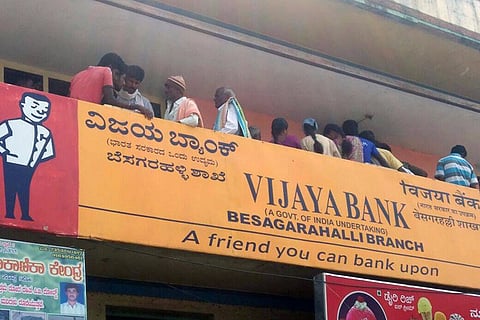

Just two hours from Bengaluru, India’s IT hub, lies the Besagarahalli branch of Vijaya Bank.
Before November 8, may be a dozen people would walk in for financial transactions each day. In the past week, harried bank staff has seen over 500 people each day.
“I don't understand why the government did not take proper measures before they decided to ban the old notes,” says an angry Range Gowda, a farmer from Hodaghatta village.
Range Gowda’s anger is unsurprising when you look at the distances. He had been standing in queue for about three hours on Thursday afternoon, after travelling 7.5km from his house. Although the journey itself takes half an hour, bus frequency is one in one-and-half-hours.
Branch Manager Navin P says that the bank caters to 39 surrounding villages. Besagarahalli alone has 2,434 families with a working population of about 4,200 people. The only other bank in the village, MDCC bank, was shut on Thursday, but has been functioning otherwise. However, it does not exchange currency notes.
“They should have thought about us and the problems we have to face and find a solution before causing more problems. But when has the government ever thought about us. They never do,” Range Gowda says.
About 1,240 lending institutions – including various types of banks and cooperative banks which are authorised to accept the old notes and issue the new ones – cater to Mandya district’s population of about 18 lakh.
Navin, is not just harassed, but also baffled. “We have been getting deposits of around Rs 85-90 lakh of old notes every day. More than 600 people come in, which is shocking. All the 2,640 Jan Dhan accounts have money deposited in them. I do not know where they got so much money from,” he added.
Villagers provide the answer. “We don't have banks in our village. Travelling to the bank kilometers away and making regular deposits in our bank account is inconvenient. So we saved money in cash or invested it in a small chit fund. Now that those notes are banned, we have no choice but to deposit them in our account,” said Reshmamma, who had been standing in line for about three hours.
With a few hundred people turning up each day, tempers sometimes run high, adding to the chaos and sometimes requiring the intervention of the three police constables posted at the bank.
If not for Besagarahalli, they would have to go to Keelara, which is about 6.5 km away from Mandya city. On Thursday morning, Keelara’s lone bank – Indian Overseas Bank – already had people waiting in serpentine queues for hours. It caters to people from Alekere, Chamalapura, Ichekere, Hodaghatta and Nalahalli villages which do not have banks or ATMs.
With multiple villages to cater to, staff at the bank has worked out their own coping mechanism. They are allowing people to withdraw only Rs 5,000 a day. For farmers with loans, the government raised the withdrawal limit to Rs 25,000.
“We do not have an infinite supply of new notes or the smaller denomination ones. To make sure that everyone gets some money, we have limited the daily withdrawal limit," said Samarjit Sahoo, assistant manager of the bank.
While the move is well-intentioned, it has made people like C Chandrashekar unhappy.
“I own a grocery store and I am not able to buy enough supplies. All my life I have been paying my suppliers with cash. The government is telling us to transfer money online but we don't have good internet connection here. Anyway, I don’t know how to operate it. I am tired of this," says 54-year-old Chandrasekhar, whose native village is Keelara.
Also in the queue was Chenna Gowda, a farmer from Ichekere, a few kilometres away.
“We have to travel at least 6 km to deposit money. That will take us a half hour bus journey. But it takes us more time as the bus arrives after one-and-a-half hour intervals. Then we have to wait in the queue. It is tiring. I have not been able to work properly for the last two days because of this," said Chenne Gowda.
Edited By Anisha Sheth